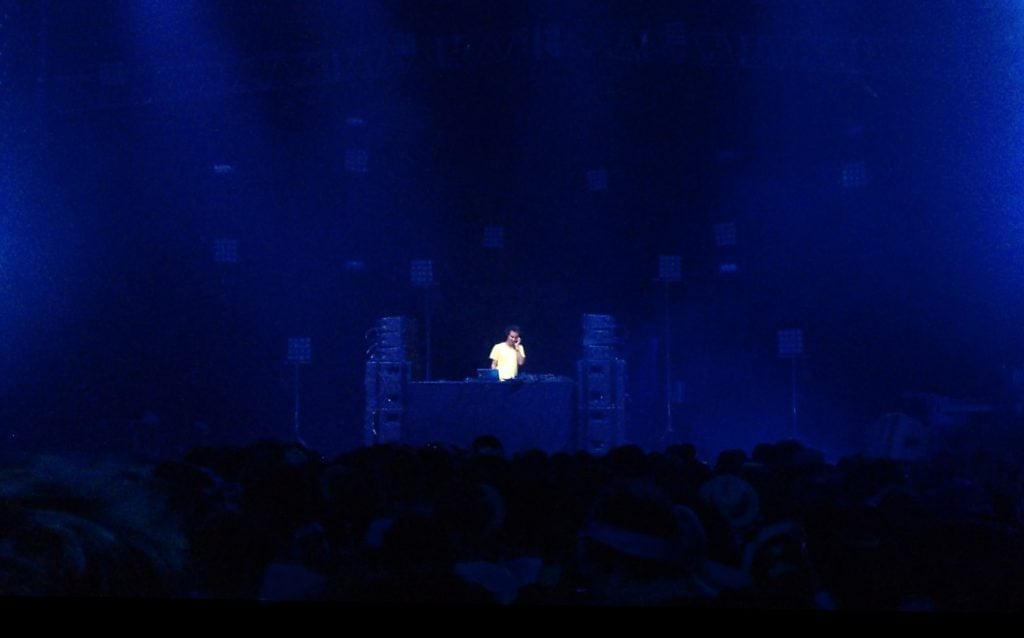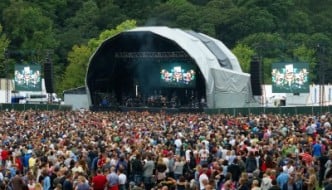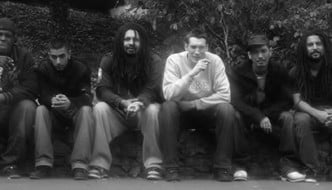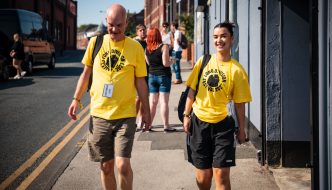
Photo: Four Tet Press
The film The Social Network follows the story arc of Mark Zuckerberg, the founder of Facebook who loses his best mates to achieve his biggest dreams. It’s a movie about a lot of things, but one can sum it up as essentially two hours of watching a nerd drown in his own narcissism. Standing in the grand space of Old Granada Studios, staring up at the Four Tet-shaped figure performing, this serves as an apt description of Kieran Hebden’s performance.
The producer-cum-dj’s return to Manchester is part of a short spell of live shows around the country, with the tour of his latest album New Energy being kept to just a handful of nights to maximise the hype – not that he needs it. It was twenty years ago that he first released an album under the moniker Four Tet; he has since experimented his way from the periphery of the alternative electronic burst that followed Radiohead’s Kid A to the nucleus of the British dance scene. He is associated with shit words like ‘folktronica’, yet is one of the most in demand DJs in the world.
Four Tet has always been excitingly unconventional. What is clear from listening to his work is that the young Londoner possesses both a geeky love for music, and an artistic intent to make something different, something that pushes the boundaries of electronic music, even if just a little. This philosophy is reflected in the staging for his performance. Choosing to set up in the centre of the room, Hebden creates a semi-circular platform of performance equipment and desk lamps that limits his visibility. And that’s it. No screens, no spotlights; no water-falling wall of fairy lights as used in his 2016 Boiler Room performance. He creates himself as the centre of attention, and demands that the audience give it him.
With his omission of support acts, such extreme stripping back of staging commonly used in live dance performances isolates the music, removing visual distractions and reemphasising the sounds produced on stage. Perhaps he’s chosen this to give people less of an excuse to take photographs. Perhaps he only had a £10 budget.
While the lack of foreplay is bold, it embodies a set of creative decisions that err on the side of arrogance. Four Tet relies solely on the strength of his music to sate the audience, and for the most part, the quality of his catalogue does so. He makes room for old infectious hits such as ‘Sing’, whilst welcoming the full-blooded club sounds of newer tracks ‘SW9 9SL’ and ‘Scientists’. They blend breathlessly, with Hebden building a bridge from one end of his diverse discography to the other, and the swooning staccato of ‘Two Thousand and Seventeen’ washes away all the bad things that happened in that year. Album filler ‘Spirit Fingers’ makes an unlikely appearance and is transformed with a new beat, with a spasming side note that spirals into a drum-driven joy to hear.
At times he dwells longer than necessary, getting lost in his own ambience and appearing to forget the audience, particularly during ‘Morning Side’ and ‘LA Trance’, which fade in and out without end. These songs are overworked and ultimately underwhelming. A few times something moves in the loins when Hebden seems ready to enter a funky phase, but he rarely stays long enough to satisfy. Breakbeat banger ‘Kool FM’ is a rare danceable moment but generally he is happy to sacrifice movement for the sake of mellowing.
After a while, the staging also gets on the nerves. Aside from the fact it leaves half the room hoping to glimpse the boring back of a perm, it simply provides no extra-sensory enhancement. A bit of flash and bang is needed. It feels more like an art installation than a stage; unfortunately it comes off less avant-garde and more try hard.
As he closes with ‘Lush’, it’s hard not to feel indifferent about the artist’s performance, and while there have been largely pleasurable parts, a real lack of ‘live’ personality is evident. Despite his diverse array of tracks, a laboured delivery means the balance between hip-thrusters and hypnotism goes missing. In the end, Hebden’s lit up face – the sole spectacle of the show – provides nothing more than an illuminated stare into a narcissist’s psyche. Knowing that, three days later, he would be whipping out the fairy light wall in his London shows just makes the knife twist more.
Filed under: Music
Tagged with: electronics, Four Tet, Kieran Hebden, manchester, music, Old Granada Studios, Visuals



Comments